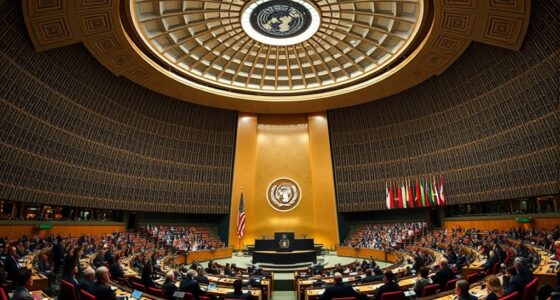By 2025, countries worldwide are actively creating AI regulations focused on ethics, safety, and transparency. Governments are establishing oversight agencies, signing international treaties, and setting clear standards to prevent biases and misuse. While some differences remain due to cultural and technological factors, collaboration is growing to manage AI’s global impact responsibly. If you want to understand how these efforts shape our future and what’s next, there’s more to explore.
Key Takeaways
- Countries are establishing ethical guidelines, transparency standards, and oversight agencies to regulate AI development and deployment.
- International treaties are harmonizing AI safety, privacy, and ethical norms across borders.
- Governments collaborate with global organizations to enforce compliance and monitor AI’s societal impact.
- Variability in cultural norms and technological capacities presents challenges to unified AI regulation.
- Future efforts focus on balancing innovation with human rights protection through proactive policies and responsible development.

Have you ever wondered how governments are shaping the future of artificial intelligence? In 2025, nations worldwide are actively developing policies to guarantee AI benefits society while minimizing risks. A key part of this effort involves establishing ethical frameworks, which set guidelines for responsible AI development and deployment. These frameworks emphasize transparency, fairness, and accountability, aiming to prevent biases and misuse. Governments recognize that without clear ethical standards, AI could inadvertently reinforce inequalities or cause harm, so they’re working to embed these principles into legislation and industry practices.
Governments are shaping AI with ethical standards to ensure responsible development and deployment.
At the international level, treaties are becoming vital tools for harmonizing AI regulations across borders. Countries understand that AI’s global nature demands cooperation, especially since a single nation’s policies can’t fully control the technology’s reach. International treaties serve as agreements to standardize safety protocols, data privacy, and ethical norms, fostering a shared sense of responsibility. For example, some treaties focus on preventing autonomous weapon proliferation, while others promote data sharing for research under strict ethical oversight. These treaties help create a unified approach, reducing the risk of regulatory gaps that could be exploited by malicious actors or lead to unsafe AI systems entering the global market.
You might notice that governments are also investing in establishing dedicated agencies or task forces to oversee AI development. These bodies often collaborate with international organizations to align policies and monitor compliance with treaties. They play a pivotal role in translating broad ethical principles into concrete regulations that developers and companies must follow. This includes mandating transparency in AI algorithms, requiring audits for fairness, and enforcing penalties for non-compliance. The goal is to build public trust and assure that AI innovation proceeds in a way that aligns with societal values. Moreover, recognizing the ethical importance of AI regulation, governments are increasingly prioritizing the development of comprehensive oversight mechanisms to ensure responsible AI deployment.
While these efforts are promising, they’re not without challenges. Different countries have varying priorities, cultural norms, and technological capabilities, making consensus difficult. Yet, the push for international treaties and ethical frameworks reflects a shared understanding: AI’s impact extends beyond borders, and safeguarding its development is a collective responsibility. As you observe these developments in 2025, it’s clear that governments are not just reacting to AI’s rapid evolution but actively shaping its future by crafting policies rooted in ethical considerations and global cooperation. This approach aims to strike a balance between fostering innovation and protecting fundamental human rights, guaranteeing AI serves humanity’s best interests worldwide.
Frequently Asked Questions
How Will AI Regulation Impact Innovation and Startups?
AI regulation can slow down innovation initially, but it also encourages responsible development by emphasizing ethical considerations. As a startup founder, you’ll need to adapt your funding strategies to comply with new rules, possibly increasing costs or seeking grants focused on ethical AI. While regulation may seem restrictive, it ultimately fosters trust and sustainability, helping your innovations stand out and succeed in a more responsible AI ecosystem.
What Are the Penalties for Non-Compliance With AI Laws?
Penalties for non-compliance are like a storm warning—serious and unavoidable. You face legal liabilities that could include hefty fines, lawsuits, or even criminal charges. Enforcement challenges make it hard to catch every violation, but authorities are increasingly strict. If you ignore AI laws, you risk damaging your reputation and facing costly consequences, so stay compliant to navigate this complex landscape safely.
How Do Different Countries Coordinate AI Regulations Globally?
You can see countries coordinate AI regulations globally through international treaties and establishing cross-border standards. These agreements help align safety, privacy, and ethical guidelines, ensuring AI develops responsibly worldwide. Countries share information, collaborate on best practices, and create unified frameworks to manage AI’s risks and benefits. By participating in international forums and treaty negotiations, nations work together to foster innovation while safeguarding public interests across borders.
Will AI Regulation Stifle Creativity in AI Development?
Like Icarus flying too close to the sun, you might worry AI regulation will limit your creative freedom. But, by considering ethical considerations, regulations can guide innovation rather than hinder it. They can provide a framework that encourages responsible development, fostering new ideas without risking harm. So, instead of stifling creativity, regulation can serve as a safety net, inspiring more daring and ethically mindful AI advancements.
How Are Privacy Concerns Addressed in New AI Policies?
You guarantee privacy concerns are addressed by implementing strict data privacy measures and ethical safeguards. Policies require transparent data collection, usage, and storage practices, giving you control over your personal information. Regulators enforce compliance through audits and penalties, so developers prioritize safeguarding user data. This approach builds trust, prevents misuse, and aligns AI development with ethical standards, ensuring your privacy remains protected even as AI advances rapidly.
Conclusion
So here you are, trusting that all these regulations will keep AI in check, even as it becomes more powerful than ever. Ironically, while nations scramble to control a technology they barely understand, AI continues to evolve beyond their grasp. You might think you’re in charge, but in reality, it feels more like trying to hold water with a sieve. Perhaps, the real question isn’t how to regulate AI, but if we can even keep up at all.









